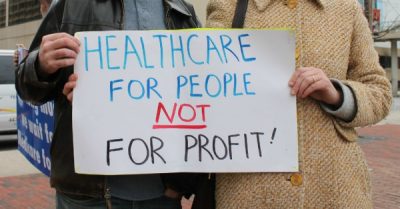The National Blackout on Affordable Healthcare. “Undermine the Legitimacy of Universal Healthcare”

As the last remaining months click down before the November elections, there has been a surreal national blackout about the dreadful state of Americans’ physical and mental health. It is the forbidden subject in Washington. A viable and affordable healthcare system is utterly taboo across the mainstream media networks, which receive their salaries from the pharmaceutical industry. Libertarians, in their infinite self-centered deregulatory non-wisdom, unsurprisingly ignore the subject altogether. Only Robert Kennedy Jr is determined to throw out the moneychangers in the federal health agencies, and Dr. Jill Stein remains committed to single payer universal health coverage. And for this reason, Washington concocts every imaginable obstacle in order to bar them from the election ballot.
The onslaught of misinformation from the corporatist wings of both political parties and media biases against universal healthcare are obviously confusing the electorate. This confusion leaves citizens bewildered about how they will pay their bills unless a fundamental overhaul of medical insurance is undertaken. More important, what will happen when you are diagnosed with a serious illness and are not fully covered? What are your chances of joining the ranks of the 530,000 families that file bankruptcy annually for medical reasons? Medical debt continues to be a growing crisis as the nation now spends $3.5 trillion annually; however. It rose to $4.3 trillion in 2021. For 2023, Americans owed at least $220 billion in medical debt, with emergency room visit costs being the leading culprit. According to the American Journal of Public Health, 66.5% of bankruptcies are medically-related. In the past, it was rare for people to go bankrupt because they did not have accessible medical care. There was a time in the US when medicine carried a higher standard of ethics. The Hippocratic Oath was respected and no one was denied medical care because they could not afford it. But that was in the past. Obama’s Affordable Care Act, which the Democrat Party continues to believe is a successful piece of legislation, has over the years been shown to be a disaster and has only accomplished an increase in the financial burden on individuals and families. As a consequence, the quality of healthcare has also steadily declined.
During the course of the Covd-19 pandemic, personal medical debt burden rose for diagnostic testing and outrageously expensive and questionable treatments, including price gouging for novel anti-SARS-2 drugs such as Remdesivir and Paxlovid.
The full throttle offensive launched by the insurance and medical industrial complex continues to undermine the legitimacy of universal healthcare. It has bought unbridled biased coverage across the media waves. The goal is to effectively sustain the current healthcare system in place. After listening to dozens of commentators on CNN, MSNBC, Fox, and the pseudo-health journalists at the New York Times, one would think that a socialized medical system is only offering free stuff at enormous cost to taxpayers. No one truly knows how much a national universal program would cost. Forecasts for a 10-year period range would be approximately $13 trillion at a bare minimum but still far less than the current annual expenditure rate of $3.5 trillion. It would be very expensive and for it to succeed dramatic infrastructural changes would need to be made throughout the entire medical establishment at both the private and public levels. That conversation is long overdue.
However, perhaps this is the wrong argument because it is based upon the Democratic Party’s deep seated cognitive dissonance to protect the vested interests of Wall Street’s financial community, the military industrial complex, and the pharmaceutical and agrochemical industries. In effect, the entirety of corporate America and the deep state, its lobbyists and oligarchic billionaires, and their sounding board in the mainstream media, are on one side of the equation while the urgent humanitarian medical needs of average citizens are on the other.
First, Medicare for All is doable and affordable. In fact, it can potentially save $1.7 trillion a year by removing from the equation unnecessary and unconscionable profit to private insurance providers and the large mega-HMO networks. There is no reason to sustain a mountain of unnecessary and costly bureaucracy between direct medical care and the patient. Every industry directly involved in providing treatment and care would continue to profit. But it would be a reasonable profit. Instead we have a medical industry that is excessively greedy and eager to take advantage of loopholes in order to milk the system for whatever it is worth.
The problem is that we can have Medicare for All only after we seriously look at what it costs to treat a patient and make efforts to reduce the exorbitant waste that has been programmed into our current system. How is it that a hospital can charge $787 for an adult and $393 for a child for a one dollar bag of intravenous saline solution, plus an additional $127 to administer it? Americans spend more on prescription medications than any other developed nation, as drug prices can soar ten times the rate of inflation. Daraprim, for example, which is prescribed to fight one of the world’s most common parasitic infections that causes toxoplasmosis, can cost $45,000 per month, or $750 for a single pill that costs $13.50 to manufacture. In 2022, the most expensive drug on the market was Novartis Gene Therapies’ Zolgensma for treating a rare childhood disorder, spinal muscular atrophy, which cost $2.1 million. Due to its costs insurers are reluctant to cover it.
According to a 2023 healthcare analysis conducted by the Peter G, Peterson Foundation, 25% of healthcare spending is simply waste ($760-935 billion per year). This is largely services and administrative processes that deliver no benefits whatsoever. In current annual figures, this includes $345 billion on private insurance paperwork, $166 billion in failure to deliver proper medical care, or “doing the wrong thing” and failing to adopt best practices. Failure to adopt preventative care is costing $111 billion, and overtreatment up to $101 billion. Healthcare coordination due to electronic health record monitoring and communication has been ridiculed for poor management and adding a further $78 billion of annual waste.
Based upon earlier figures between 2012-2015, about $2.6 trillion can be saved by removing bureaucratic waste. That report included $471 billion for administrative insurance billing, $140 billion for medical fraud, and $210 billion for unnecessary medical testing.
Universal healthcare will not break the economy. What is breaking the economy is our current broken medical system and the widespread incompetency across the federal agencies due to corporate capture. Universal quality care is easily within reach but only after the health of the population is given preference over the healthcare system’s vulture capitalism. Then Americans will no longer have to worry about bankruptcy, which further contributes to the stresses associated with ill health, because they cannot afford the treatments or medications without putting themselves and their family into perpetual debt.
Second, providing universal healthcare does not guarantee that patients will receive quality care. If we are truly honest with ourselves and ask whether the US has the best medical care available, the answer should be a resounding no. American emergency medicine is exemplary. However, chronic care for treating heart disease, cancer, diabetes, pain management and neurological conditions has been a dismal failure. More physicians need to be brought into the system without the anxiety of paying off enormous school debt and being forced to work to exhaustion. If a doctor prefers to gouge patients, that is their right to do outside of the national system.
Finally, the US lags far behind in implementing a national preventative program. Very little is being done to prevent diseases shown to be directly related to life-style, diet and toxic chemicals and conditions in our environment. A viable prevention program would begin by supporting and mandating holistic health programs in our schools beginning with grade school. Why does offering school courses in “How to be Healthy” seem absurd when it has been shown repeatedly in the scientific literature and efforts in other advanced nations to avoid preventable illnesses and further reduce avoidable medical costs? But in order to launch a comprehensive preventative program at a national scale, only respected educated health consumers should be in charge. Entities representing private corporate interests should be prohibited since they are responsible for the medical disasters that now demand for universal healthcare. If Obamacare and the current corporate medical establishment were truly effective, there would be no debate about Medicare for All. It would be a no brainer.
Yes, universal healthcare will be expensive and cost trillions. But how many trillions will it save when all else is considered for how many lives will be saved and how healthier the nation would be if comprehensive measures were taken to prevent disease in the first place.
*
Click the share button below to email/forward this article to your friends and colleagues. Follow us on Instagram and Twitter and subscribe to our Telegram Channel. Feel free to repost and share widely Global Research articles.
One Month Before Global Research’s Anniversary
Richard Gale is the Executive Producer of the Progressive Radio Network and a former Senior Research Analyst in the biotechnology and genomic industries.
Dr. Gary Null is host of the nation’s longest running public radio program on alternative and nutritional health and a multi-award-winning documentary film director, including his recent Last Call to Tomorrow.
They are regular contributors to Global Research.



